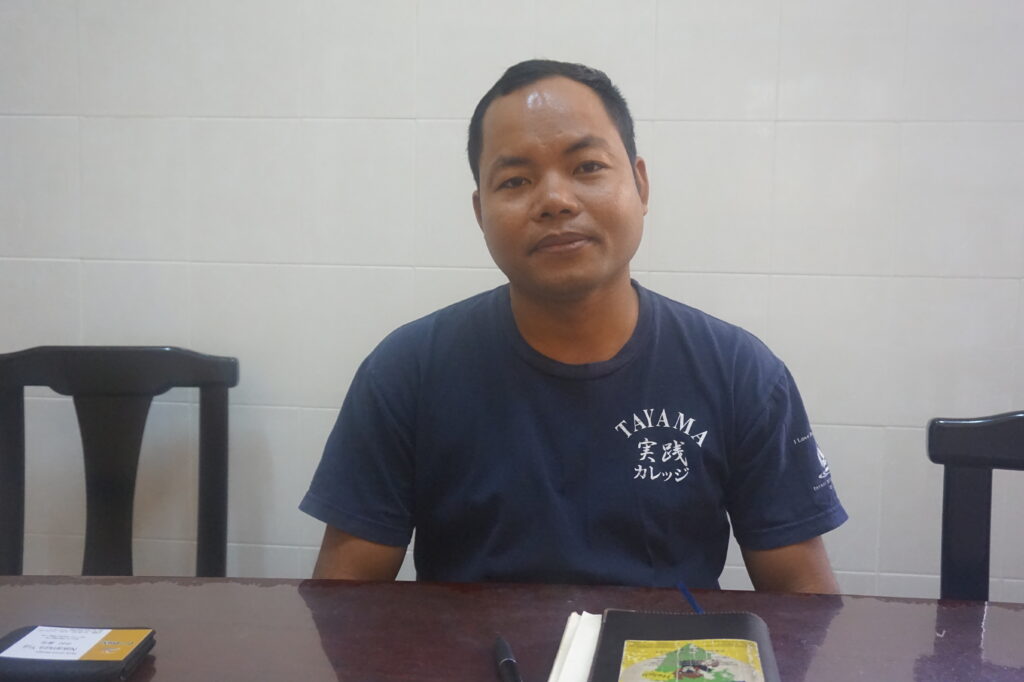TAYAMA Business School Principal Mr. Nhoek Chamraeun
– Congratulations on the 10th anniversary of Tayama Business School.
Thank you. We plan to organize a party to celebrate our 10th anniversary on 11th March, in which our previous graduates also plan to participate.
– Firstly, please tell us about the specialty of Tayama Business School.
We teach not only the Japanese language, but also about Japanese culture and greeting, how to reply properly, make eye contact when talking, about cleaning, keep promises, be on time, and so on. All of these are what Japanese people usually do, and are what students have to learn in order to work with Japanese people in the future.
– Recently, the number of Japanese language schools has increased, so please tell us about the difference between those and Tayama Business School.
I think that the first thing is about feelings. We teach not only the Japanese language, but we also educate the internal spirit. Other Japanese language schools also started to adopt this point, but I think that is good. Because it is a good point, that’s why it is imitated. If it is a bad point, there will be no imitation. In fact, some of the teachers at other schools are just some graduates of Tayama School. All of these are done for the development of Cambodia.
– So, do almost all of the students want to learn the Japanese language just because they like Japan?
I think so. And maybe it’s just my personal feelings, but I think that even though there have been many countries trying to help Cambodia, there are only a few countries that are helping Cambodia without asking for any compensation or without having any expectation. Japan is one of those few countries, that’s why people have respect and like Japan very much. Seeing their seniors working in Japanese companies, students feel that working in a Japanese company which pays very well is admirable.
– In Cambodia, the presence of Japan is still a minority. So, don’t you think that students should study English or Chinese rather than the Japanese language?
In the past, we used to try to teach English and computer skills besides the Japanese language, but as a result after 2 years, students couldn’t master any of those skills and everything ended up incomplete. Therefore, now we are focusing on only the Japanese language. However, Tayama Business School also teaches students about study methods and how to enjoy their studies, so if they understand that, they will be able to learn Chinese or English very quickly.
– If we think back to the past 10 years, I believe that there have been many happenings. What kind of memories do you have from those times?
We had a really hard time during the first generation of our students. Japanese teachers and Cambodian students couldn’t understand each other. We did not know how strict we should be, or what actions were considered too much. Both our students and teachers had no knowledge about those at all. Due to that, among the 250 students who had entered the school from the beginning, some quit the school because they couldn’t bear the strictness, and some quit after having quarrels with teachers, and in the end, there were only 47 students remaining at the time of graduation. Nowadays, the graduation rate has increased, for example, last year, 163 students out of 230 students upon the time of entrance successfully graduated. However, it is still difficult for all students to graduate without fail. Besides, there are some students who quit the school after one year of study just because they want to start working immediately, but there are also some other students who quit because they need to study abroad or some students only quit after they can find a job, so I think that the reasons for quitting school have become more positive compared to the past.
– Please tell us about your next goals.
I want to make a school with 1000 to 2000 students. Besides, so far job opportunity has been limited only within the country, so I would like to expand our activity worldwide including technical intern training in Japan, etc. At the same time, since there are students who wish to continue studying but cannot, people who wish to work but cannot, I would like to increase the number of our students, but our current situation is that our classrooms are always full with only 230 students. Therefore, in the future, I would like to enlarge Tayama Business School, and also expand to other cities besides Phnom Penh.
– Lastly, do you have anything that you hope or expect from Japan or Japanese people?
Especially when they are angry, I want them not to scold loudly in public places or places where there are many people. Cambodian people will feel very bad and embarrassed when being scolded loudly in front of other people, and they will not try to correct for improvement. In addition, Japanese people should avoid scolding people when they are having meals. Actually, it is good just to call them out for a talk after they finish their meal properly, but scolding on the spot without thinking about time, place, and occasion is not a good act at all. If Japanese people can understand all of these feelings of Cambodian people, they can do things more easily, and it is good for both parties. There is one more thing that I am thinking about. Among those who try to find a way into Cambodia but cannot go smoothly and end up withdrawing themselves, most of them are those who never listen to the Cambodian people. Of course, Japanese people have high technical skills, and they are smart and successful in Japan, but Japan and Cambodia are different. They are successful, but not in Cambodia. In Japan, whether it is human resources or infrastructure, everything is favorable. But, that is not happening in Cambodia. I think that unless you recognize these matters and start to cooperate with the Cambodian people, you cannot get things done successfully solely with Japanese ways of thinking or a sense of value.

